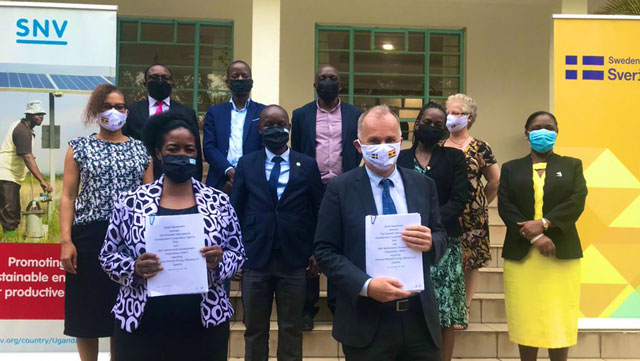
Kampala, Uganda | THE INDEPENDENT | The Embassy of Sweden has donated Sh 31 billion ($8.8 million) towards the development and adoption of reliable energy products.
The funds are provided under the Inclusive Markets for Energy Efficiency in Uganda (IMEU) program that focuses on energy efficiency sector development for improved livelihoods and increased Small and Medium Enterprise (SME) resilience and competitiveness.
Ola Hallgren, the Head of Cooperation at the Embassy of Sweden said that the program is aimed at increasing critical needs to address Uganda’s energy needs and services in agriculture and the environment.
“Agriculture makes up for 24 percent and the construction industry 12 percent of Uganda’s Gross Domestic Product (GDP). Given the dominance of agriculture as a source of livelihood, and the built environment as a developing sector, increased efficiency in agro-industrialization and construction are key to improving GDP,” he said.
The program will be rolled out from December 2021 to November 2025 by SNV Netherlands Development Organization in collaboration with Makerere University College of Engineering, Design, Art, and Technology –CEDAT and the Private Sector Foundation of Uganda (PSFU).
The program is meant to contribute to climate resilience and mitigation, the competitiveness of businesses, and reduction of health risks in the built environment and agribusiness focusing on increasing demand for energy efficiency products and services, strengthening the supply of energy efficiency products and support to SMEs.
The core target areas for the program are agribusinesses and farmers cooperatives and built environment which focuses on households, businesses, and institutions, including selected value chains like dairy, tea, cereals, oil crops, horticulture in different Agricultural Ecological Zones, rural communities, and cities.
Hallgren said that to increase access to clean and reliable energy in Uganda, it is important to have a holistic approach and to involve stakeholders at every level.
He said that the Embassy is pleased to support the program since it brings a variety of actors together that share a common objective of ensuring energy is used more efficiently by small and large-scale consumers.
Phomolo Maphosa, the Country Director SNV Uganda cited the need for all to embrace energy efficiency as an integrated cost-effective option to achieving an inclusive low carbon and climate-resilient development that supports people and businesses to thrive in a changing climate world.
According to Maphosa, the program will improve the livelihoods of 150,000 people directly and 450,000 indirectly.
Francis Kisirinya, the Acting Executive Director PSFU said that their mission is to enhance business growth and competitiveness for sustainable wealth creation and shared value. He said that the project is well aligned with the mission.
Professor John Baptist Kirabira, the Chair Department of Mechanical Engineering at the School of Engineering at Makerere University said that the program contributes to social problem solutions and will ensure it is a success.
Close to 90 percent of Uganda’s population still cook on open fires or inefficient stoves hence causing significant health risks and damage to the climate due to emissions and deforestation.
It is hoped that the inclusion of energy efficiency in the national planning process could increase energy access to 6 million rural customers and reduce carbon dioxide emissions by 10.6 million tons by 2030.
****
URN
 The Independent Uganda: You get the Truth we Pay the Price
The Independent Uganda: You get the Truth we Pay the Price






This ideas will improve agricultural sector and economic growth of the country as well as social needs of people!!!!!